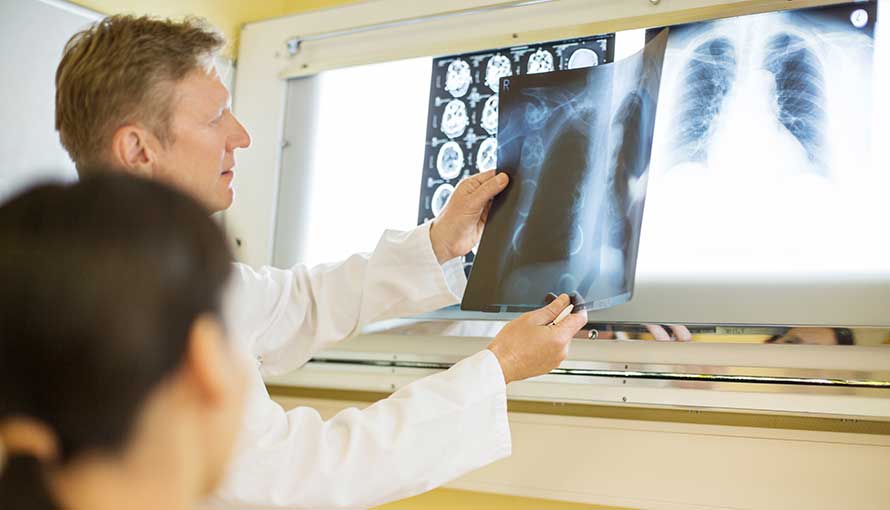What Is the Difference Between Small Cell Lung Cancer Non-Small Cell Lung Cancer?

Non-small cell lung cancer is the most common form of lung cancer, accounting for approximately 85 percent of all cases. It can be further classified into subtypes:
- Adenocarcinoma – The most common subtype, which is slow growing and usually forms in the outer parts of the lungs
- Squamous cell carcinoma – A very slow growing form of non-small cell lung cancer that often develops in one of the lungs’ airways (bronchi)
- Large cell carcinoma – The most uncommon subtype of non-small cell lung cancer, which is fast growing and more likely to spread
Small cell lung cancer, also known as oat cell cancer, is more uncommon, accounting for the other 15 percent of lung cancer cases. When viewed under a microscope, the cancerous cells of this disease appear round and undersized in comparison with non-small cell lung cancer.
The small cell malignancy typically originates in the bronchi in the middle of the chest. Small cell lung cancer tends to grow more quickly and often spreads to the lymph nodes or other organs, and it is also typically more responsive to chemotherapy. Small cell lung cancers can be further classified as:
- Small cell carcinoma – The most common type of small cell lung cancer where the cells look flat underneath a microscope
- Combined small cell carcinoma – A less common type of cancer where the tumor is made up of small cell carcinoma cells and a small number of non-small cell lung cancer cells
Similar risk factors for both types of lung cancer
People who smoke face a higher risk for both small cell and non-small cell lung cancer than non-smokers, and there are other risk factors such as exposure to secondhand smoke, radiation or asbestos. Those who live in areas with high levels of air pollution are also at a higher risk for developing lung cancer, as are those with a family history of lung cancer.
Symptoms of small cell and non-small cell lung cancer

Patients with either type of lung cancer tend to have similar symptoms, including:
- Chest pain or discomfort
- A chronic cough that gets worse over time
- Breathing difficulties
- Wheezing
- Hoarseness
- Trouble swallowing
- Coughing up blood
- Loss of appetite
- Unexplained weight loss
- Facial swelling
- Swollen neck veins
However, because small cell lung cancer typically grows and spreads to other parts of the body faster than non-small cell lung cancer, small cell lung cancer may also cause symptoms such as bone pain, confusion, seizures and paralysis.
Treatment options for different types of lung cancer
When prescribing treatment for lung cancer, physicians consider a number of factors, such as the individual’s overall health, the cancer’s stage of development and its location in the lungs.
Surgical removal of the cancerous cells is more likely to be an option for patients with non-small cell lung cancer if the disease has not affected a large portion of the lungs or spread to other parts of the body. Other treatments may include chemotherapy, radiation therapy, immunotherapy and targeted drug therapy aimed at slowing the cancer’s growth.
The main treatment for small cell lung cancer is chemotherapy, and radiation may be used to boost its effectiveness.
How do I know which type of lung cancer I have?
When your physician first suspects you have lung cancer, you will likely need a medical imaging scan, such as an MRI or X-ray, to identify any abnormal growths. If a tumor is present, an oncologist will obtain a small sample of the lesion through a biopsy, which will then be examined through a microscope to determine the kind of lung cancer you have. Each type of lung cancer has different characteristics that help with identification. The most effective course of treatment for you will depend on the type and subtype of your malignancy, in addition to many other factors.
Medically Reviewed by Dr. Alberto Chiappori.
If you have been recently diagnosed with lung cancer, Moffitt Cancer Center can provide you with the comprehensive treatment you need to achieve the best possible outcome and an improved quality of life. The specialists in our Thoracic Oncology Program create individualized treatment plans for our patients to address the challenges of each unique cancer. Schedule a consultation at Moffitt by calling 1-888-663-3488 or by submitting a new patient registration form online. After a cancer diagnosis, every day counts. So when you turn to Moffitt Cancer Center, you will be able to connect with a cancer expert as soon as possible.
FAQs
- Signs and Symptoms
- Diagnosis
- Treatment
- FAQs
- Lung Cancer Early Detection Center
- Lung Cancer Screening and Surveillance Program
- Lung Nodules
- Lung Surveillance Clinic
- Metastatic Lung Cancer
- Recurrence
- Survival Rate
- Your Lung Cancer Specialists
- Lung and Thoracic Tumor Education (LATTE)
- Thoracic Clinic Updates
- Insurance & Financial Information
